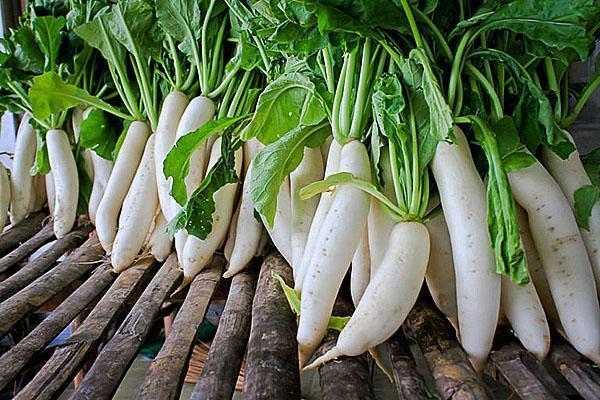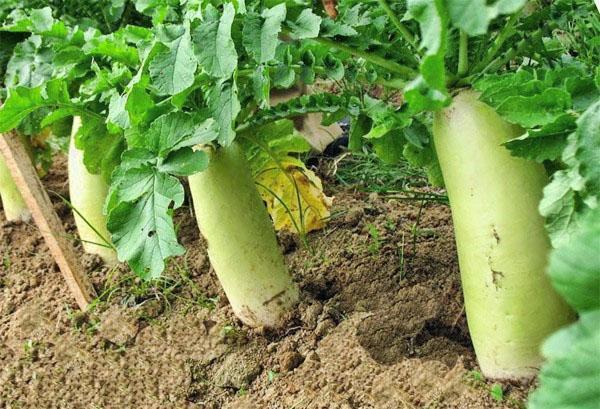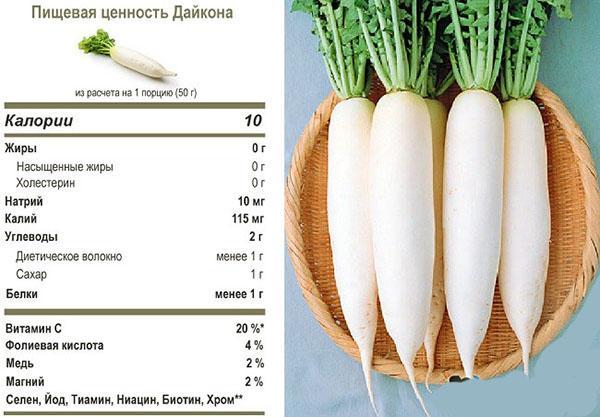Influence of useful and harmful substances of daikon on human health

The daikon radish is native to Japan, in its homeland it is an essential part of the daily diet. The culture is known to many gardeners and gardeners, it has a high yield and long shelf life, excellent taste and medicinal properties. What are the benefits and harms of daikon, are there any contraindications and restrictions, in what form is it better to eat this vegetable?
Daikon culture - fact sheet

Translated from Japanese, daikon is a big root. Indeed, root crops can reach gigantic sizes - grow in length up to 50-60 cm and gain weight over 0.5 kg.
The culture has many varieties that differ in the shape and size of the root crop, taste and shade of pulp. The seeds do not lose quality for a long time and remain viable for five years. The optimal sowing time is mid-summer, late July - early August. Growing conditions and techniques are very similar to radish... The vegetative period ranges from 60 to 70 days, during which time gardeners manage to collect up to three harvests.
The chemical composition of the root crop
 Nutritional value and chemical composition explain why daikon is beneficial to the body. The calorie content of 100 grams of a vegetable is only 20 kcal, and its glycemic index is 15 units. The pulp contains nutrients - proteins and carbohydrates, no fat, there are dietary fiber and bactericidal components, essential amino acids, enzymes, useful vitamins, salts and minerals.
Nutritional value and chemical composition explain why daikon is beneficial to the body. The calorie content of 100 grams of a vegetable is only 20 kcal, and its glycemic index is 15 units. The pulp contains nutrients - proteins and carbohydrates, no fat, there are dietary fiber and bactericidal components, essential amino acids, enzymes, useful vitamins, salts and minerals.
Daikon is a dietary food product, it has a low calorie content and no fats, it has a high concentration of fiber and pectins.
 Daikon pulp contains:
Daikon pulp contains:
- proteins and carbohydrates - quickly satisfy hunger and give a feeling of fullness;
- fiber - normalizes digestion and stimulates the intestines;
- glycosides - regulate the functions of the human nervous system;
- amino acids are an essential part of the diet;
- pectins - regulate cholesterol and blood sugar levels;
- enzymes - promote better digestion and absorption of food;
- vitamins - eliminate the risk of vitamin deficiency;
- minerals - regulate hormonal levels, improve well-being;
- phytoncides are valuable biologically active substances endowed with bactericidal properties.
Daikon - health benefits and harms
 The edible part of the plant is a storehouse of useful and vital components, the combination of which is aimed at improving and restoring the body, increasing tone and performance. Regular consumption of root vegetables in food has a positive effect on the immune, circulatory and cardiovascular system, supports the health of the thyroid gland and genitals, improves the activity of the brain and spinal cord.
The edible part of the plant is a storehouse of useful and vital components, the combination of which is aimed at improving and restoring the body, increasing tone and performance. Regular consumption of root vegetables in food has a positive effect on the immune, circulatory and cardiovascular system, supports the health of the thyroid gland and genitals, improves the activity of the brain and spinal cord.
Daikon radish - benefits and harms:
- Why is daikon useful?Enzymes help to normalize metabolism, accelerate metabolism and tissue regeneration. Phytoncides have anti-inflammatory, analgesic and antioxidant effects. Vitamins and minerals help strengthen immunity and improve health. Fiber and pectin enhance intestinal motility, cleanse the body and remove toxins. Essential amino acids resist cell degeneration, the development of erosive and tumor processes. The pulp and juice are used internally and externally.
- Possible harm to the body. The rough structure of a vegetable can provoke an exacerbation in diseases of the digestive system - gastritis, pancreatitis, cholecystitis, erosions and ulcers. Daikon should be used with caution in cases of cholelithiasis and intestinal hyperactivity. Organic acids present in the juice are unacceptable in case of increased gastric acidity. Radish can cause allergic reactions and skin rashes.
If any pain occurs, you should completely abandon the inclusion of this vegetable in your diet.
How daikon affects the human body
 Daikon radish is a natural source of health. If you systematically eat it, you can cleanse your body well and improve your health, strengthen your defenses, and get a boost of vivacity and energy.
Daikon radish is a natural source of health. If you systematically eat it, you can cleanse your body well and improve your health, strengthen your defenses, and get a boost of vivacity and energy.
Daikon - useful properties:
- For woman. Fiber and pectins, which are concentrated in the root vegetable, allow the use of daikon for weight loss. Insoluble fiber takes a very long time to digest, which provides a person with a pleasant satiety feeling.
- For a man. The vegetable is one of the powerful aphrodisiacs. With regular use, it increases libido and improves potency, helps to normalize hormonal levels.
- For an elderly person. Radish helps the body to resist viruses and infections, especially during the off-season, when the risk of respiratory and colds increases significantly. It is effective for the prevention and treatment of atherosclerosis, gout and rheumatism, which is especially important in old age.
- For a child. The positive all-round effect of white radish on children is achieved due to the diverse composition and high nutritional value of the product. Eating fresh vegetables helps the development of the oral cavity - jaws, tongue and teeth, normalizes digestion and stool.
- During pregnancy and lactation. Daikon contributes to the full intrauterine formation and development of the fetus. Radish is a mild diuretic, allowing you to remove excess fluid from the body, which is very useful during the period of gestation. The vegetable is effective in increasing lactation and improving the quality of breast milk.
Daikon for weight loss - video
Recommendations for eating
 In addition to its beneficial properties, daikon has contraindications, which most often arise from improper eating of vegetables and fruits. In case of disturbances in the activity of the gastrointestinal tract, it is necessary to ask the doctor what benefits and harm the daikon radish has to the body. For any pathology during the acute stage, it is not recommended to use a vegetable.
In addition to its beneficial properties, daikon has contraindications, which most often arise from improper eating of vegetables and fruits. In case of disturbances in the activity of the gastrointestinal tract, it is necessary to ask the doctor what benefits and harm the daikon radish has to the body. For any pathology during the acute stage, it is not recommended to use a vegetable.
The main rule of eating daikon is moderation. A vegetable should be introduced into the diet gradually, starting with its inclusion in vegetable salads, snacks and side dishes.
Daikon, rules of eating:
- The quality of the root crop is assessed visually and by touch. It must be clean, fresh and healthy, free from defects, cracks, discoloration and wormholes.
- Most often, it is used raw as an ingredient in vegetable salads, but it can be heat treated - boiled, stewed, fried.
- The radish is stored in a refrigerator wrapped in a plastic bag.
- The process of preparing the radish is simple - the vegetable is peeled, cut into slices or grated, salted to taste and poured with vegetable oil.
- A healthy person can consume daikon daily in moderation. Elderly people should use it with caution, preferably in a grated form or squeezed juice from it.
- It is allowed to include radish in the children's diet from the age of three, observing the body's response.
 The original taste of daikon goes well with simple and sophisticated products - meat, fish, mushrooms and seafood, it goes perfectly with a variety of dressings and sauces, other vegetables and fruits. Gourmets prefer young shoots and leaves of the plant, oriental and Asian dishes with it. With reasonable use, this healthy vegetable is essential for every person at any age for the purpose of treatment and prevention.
The original taste of daikon goes well with simple and sophisticated products - meat, fish, mushrooms and seafood, it goes perfectly with a variety of dressings and sauces, other vegetables and fruits. Gourmets prefer young shoots and leaves of the plant, oriental and Asian dishes with it. With reasonable use, this healthy vegetable is essential for every person at any age for the purpose of treatment and prevention.